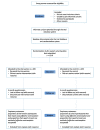An Intervention Delivered by App Instant Messaging to Increase Acceptability and Use of Effective Contraception Among Young Women in Bolivia: Protocol of a Randomized Controlled Trial
- PMID: 29254910
- PMCID: PMC5748473
- DOI: 10.2196/resprot.8679
An Intervention Delivered by App Instant Messaging to Increase Acceptability and Use of Effective Contraception Among Young Women in Bolivia: Protocol of a Randomized Controlled Trial
Abstract
Background: Unintended pregnancy is associated with numerous poorer health outcomes for both women and their children. Fulfilling unmet need for contraception is essential in avoiding unintended pregnancies, yet millions of women in low- and middle-income countries continue to face obstacles in realizing their fertility desires. In Bolivia, family planning progress has improved in recent decades but lags behind other countries in the region. Unmet need for contraception among women aged 15 to 19 years is estimated to be 38%, with the adolescent fertility rate at 70 per 1000 women. Mobile phones are an established and popular mode in which to deliver health behavior support. The London School of Hygiene & Tropical Medicine and the Centro de Investigación, Educación y Servicios in Bolivia have partnered to develop and evaluate a contraceptive behavioral intervention for Bolivian young women delivered by mobile phone. The intervention was developed guided by behavioral science and consists of short instant messages sent through an app over 4 months.
Objective: The objective of this study is to evaluate the effect of the intervention on young women's use of and attitudes toward the most effective contraceptive methods.
Methods: We will allocate 1310 women aged 16 to 24 years with an unmet need for contraception in a 1:1 ratio to receive the intervention messages or the control messages about trial participation. The messages are sent through the Tú decides app, which contains standard family planning information. Coprimary outcomes are use and acceptability of at least one effective contraceptive method, both measured at 4 months.
Results: Recruitment commenced on March 1, 2017 and was completed on July 29, 2017. We estimate that the follow-up period will end in January 2018.
Conclusions: This trial will evaluate the effect of the intervention on young women's use of and attitudes toward the (nonpermanent) effective contraception methods available in Bolivia.
Trial registration: ClinicalTrials.gov NCT02905526; https://clinicaltrials.gov/ct2/show/NCT02905526 (Archived by WebCite at http://www.webcitation.org/6vT0yIFfN).
Keywords: Bolivia; adolescent; behavior change; cell phone; contraception behavior; reproductive health; smartphone; young adult.
©Ona L McCarthy, Veronica Osorio Calderon, Shelly Makleff, Silvia Huaynoca, Baptiste Leurent, Phil Edwards, Jhonny Lopez Gallardo, Caroline Free. Originally published in JMIR Research Protocols (http://www.researchprotocols.org), 18.12.2017.
Conflict of interest statement
Conflicts of Interest: None declared.
Figures
Similar articles
-
An Intervention Delivered by Mobile Phone Instant Messaging to Increase Acceptability and Use of Effective Contraception Among Young Women in Bolivia: Randomized Controlled Trial.J Med Internet Res. 2020 Jun 22;22(6):e14073. doi: 10.2196/14073. J Med Internet Res. 2020. PMID: 32568092 Free PMC article. Clinical Trial.
-
An intervention delivered by text message to increase the acceptability of effective contraception among young women in Palestine: study protocol for a randomised controlled trial.Trials. 2017 Oct 3;18(1):454. doi: 10.1186/s13063-017-2191-1. Trials. 2017. PMID: 28974258 Free PMC article. Clinical Trial.
-
A randomised controlled trial of an intervention delivered by app instant messaging to increase the acceptability of effective contraception among young people in Tajikistan: study protocol.BMJ Open. 2017 Sep 21;7(9):e017606. doi: 10.1136/bmjopen-2017-017606. BMJ Open. 2017. PMID: 28939582 Free PMC article. Clinical Trial.
-
A randomized controlled trial of an intervention delivered by mobile phone app instant messaging to increase the acceptability of effective contraception among young people in Tajikistan.Reprod Health. 2018 Feb 13;15(1):28. doi: 10.1186/s12978-018-0473-z. Reprod Health. 2018. PMID: 29433506 Free PMC article. Clinical Trial.
-
Canadian Contraception Consensus (Part 1 of 4).J Obstet Gynaecol Can. 2015 Oct;37(10):936-42. doi: 10.1016/s1701-2163(16)30033-0. J Obstet Gynaecol Can. 2015. PMID: 26606712 English, French.
Cited by
-
Feasibility of Using Short Message Service and In-Depth Interviews to Collect Data on Contraceptive Use Among Young, Unmarried, Sexually Active Men in Moshi, Tanzania, and Addis Ababa, Ethiopia: Mixed Methods Study With a Longitudinal Follow-Up.JMIR Form Res. 2019 Jun 26;3(2):e12657. doi: 10.2196/12657. JMIR Form Res. 2019. PMID: 31244476 Free PMC article.
-
SMS-based family planning communication and its association with modern contraception and maternal healthcare use in selected low-middle-income countries.BMC Med Inform Decis Mak. 2020 Sep 10;20(1):218. doi: 10.1186/s12911-020-01228-5. BMC Med Inform Decis Mak. 2020. PMID: 32912201 Free PMC article.
-
Using Digital Technology for Sexual and Reproductive Health: Are Programs Adequately Considering Risk?Glob Health Sci Pract. 2019 Dec 23;7(4):507-514. doi: 10.9745/GHSP-D-19-00239. Print 2019 Dec 23. Glob Health Sci Pract. 2019. PMID: 31874936 Free PMC article.
-
An Intervention Delivered by Mobile Phone Instant Messaging to Increase Acceptability and Use of Effective Contraception Among Young Women in Bolivia: Randomized Controlled Trial.J Med Internet Res. 2020 Jun 22;22(6):e14073. doi: 10.2196/14073. J Med Internet Res. 2020. PMID: 32568092 Free PMC article. Clinical Trial.
-
The Impact of a Maternal Education Program Through Text Messaging in Rural China: Cluster Randomized Controlled Trial.JMIR Mhealth Uhealth. 2018 Dec 19;6(12):e11213. doi: 10.2196/11213. JMIR Mhealth Uhealth. 2018. PMID: 30567693 Free PMC article.
References
-
- Brown S, Eisenberg L, editors. The Best Intentions: Unintended Pregnancy and the Well-Being of Children and Families. Washington, DC: National Academies Press; 1995. - PubMed
-
- Hardee K, Eggleston E, Wong EL, Irwanto. Hull TH. Unintended pregnancy and women's psychological well-being in Indonesia. J Biosoc Sci. 2004 Sep;36(5):617–26. - PubMed
-
- Gipson JD, Koenig MA, Hindin MJ. The effects of unintended pregnancy on infant, child, and parental health: a review of the literature. Stud Fam Plann. 2008 Mar;39(1):18–38. - PubMed
Associated data
LinkOut - more resources
Full Text Sources
Other Literature Sources
Medical



